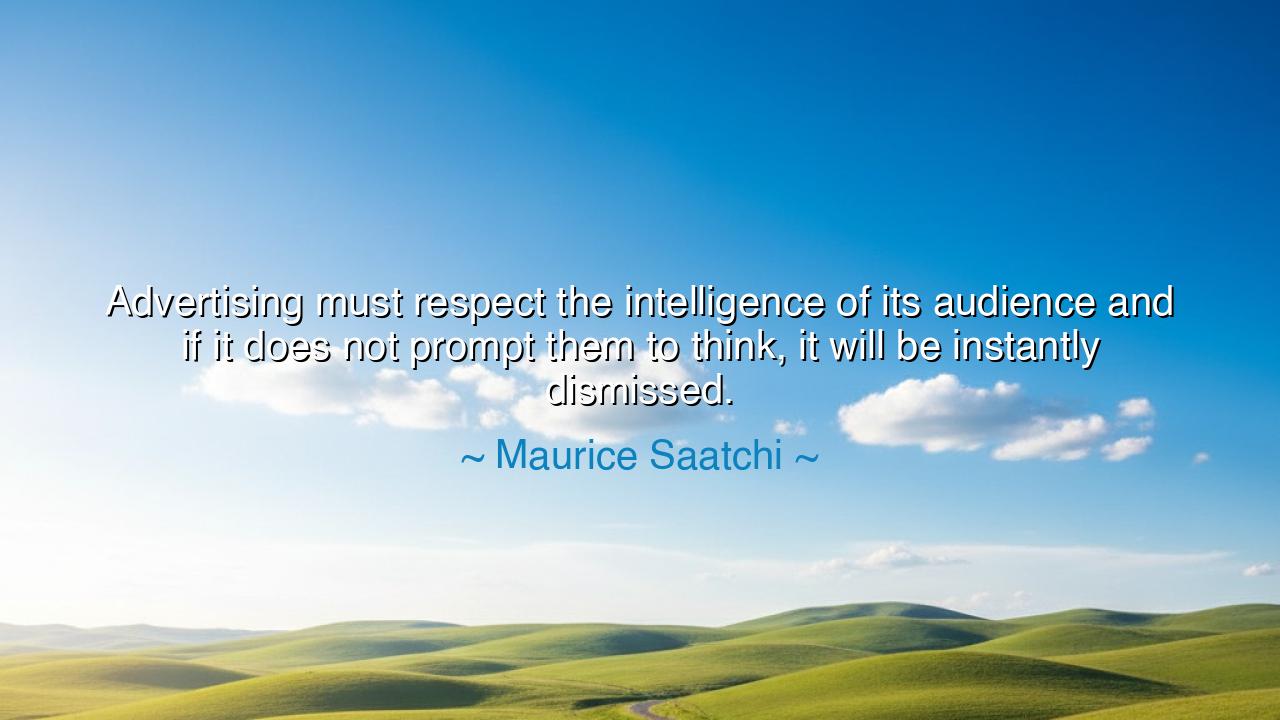
Advertising must respect the intelligence of its audience and if
Advertising must respect the intelligence of its audience and if it does not prompt them to think, it will be instantly dismissed.






The words of Maurice Saatchi, master of persuasion and co-founder of one of the greatest advertising empires of the modern age, resound with timeless wisdom: “Advertising must respect the intelligence of its audience and if it does not prompt them to think, it will be instantly dismissed.” Though born in the age of commerce, these words carry the spirit of philosophy, for they speak not merely of markets and brands, but of human understanding—the eternal law that no mind can be moved by what it does not respect. Saatchi reminds us that communication, whether in business, art, or life, is not an act of domination but of dialogue. To speak persuasively is not to manipulate, but to awaken thought, to stir the imagination of those who listen.
Maurice Saatchi, along with his brother Charles, rose to prominence during the golden age of advertising in Britain, crafting campaigns that became legend. They understood that true persuasion rests not upon deception or spectacle, but upon insight into the human mind. When Saatchi spoke of respecting the intelligence of the audience, he spoke as a modern-day rhetorician, heir to the ancient teachers who believed that the art of persuasion is rooted in truth. For just as the great orators of Greece and Rome knew that the people would turn away from hollow words, so too does Saatchi recognize that in the modern world, where messages flood every eye and ear, the mind will only pause for that which invites reflection.
The essence of his quote is a law of authentic connection: that every act of communication—be it advertising, leadership, or art—must honor the dignity of the human intellect. To respect intelligence is to understand that the listener is not a vessel to be filled, but a flame to be kindled. Saatchi’s words echo an older truth from the philosopher Aristotle, who wrote that persuasion arises not merely from emotion or authority, but from the appeal to reason—the mind’s own power to discern and decide. When a message challenges the audience to think, it becomes not a command but a collaboration; it allows the listener to see themselves as participant, not pawn.
Consider the story of Apple’s “Think Different” campaign, born in the late 1990s, when the company faced near ruin. Instead of shouting about products or prices, Apple appealed to intellect and imagination. The campaign honored those who had changed the world through thought—Einstein, Gandhi, Picasso—and in doing so, it called upon the audience’s own sense of possibility. It respected them as creators, not consumers. The result was more than success; it was rebirth. Apple’s revival became a living testament to Saatchi’s wisdom: that when you honor the intelligence of others, you ignite their loyalty and belief.
In contrast, history is filled with examples of messages that failed because they insulted the intelligence of their audience. Empty propaganda, deceptive promises, and shallow flattery may deceive for a day, but truth has a longer memory. When the Roman emperors fed the populace with “bread and circuses,” the people cheered for a time—but when famine came, the illusions shattered, and the empire’s trust dissolved. So too in our own age: every hollow slogan, every false claim, is a monument to short-sightedness. For as Saatchi warns, that which does not prompt thought is instantly dismissed—it vanishes like smoke before the wind of discernment.
His insight carries meaning far beyond the world of advertising. It is a law of life itself. To respect intelligence is to engage with others as equals in spirit, to recognize the light of reason that dwells within every human being. Whether you lead a company, teach a child, or speak to a friend, the same rule holds true: if your words do not awaken thought, they will not endure. The greatest communicators—be they prophets, poets, or visionaries—do not seek to overpower their listeners but to awaken their inner voice. They do not tell people what to think; they inspire them to think for themselves.
Therefore, O seeker of wisdom, let this teaching guide you: never speak down to your audience, whether that audience is one person or a thousand. In your words, in your work, and in your actions, appeal always to the best within others, not the lowest. Challenge their minds, kindle their curiosity, and speak truth with humility and grace. For when you respect the intelligence of others, you not only earn their trust—you elevate them, and in so doing, you elevate yourself.
And remember this: thought is sacred. Every message that endures, every story that moves hearts across generations, does so because it honors the intellect and the spirit. Maurice Saatchi teaches that to truly persuade, one must first revere the power of understanding. So let your words be like sparks in the darkness—bright enough to awaken, humble enough to endure. For the mind, once touched by genuine thought, will never again settle for illusion.






AAdministratorAdministrator
Welcome, honored guests. Please leave a comment, we will respond soon